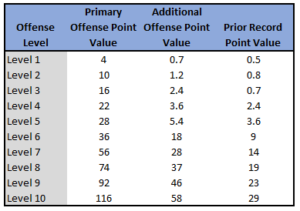The Criminal Punishment Code (CPC) is a scoring system that was implemented in 1998 to ensure uniform, proportional and unbiased minimum sentencing decisions for all felony crimes.
With this code, each felony offense is assigned an Offense Level between 1 and 10, 10 being assigned to more serious crimes. Once the offense level is assigned, the CPC uses a complex formula that considers a variety of factors related to the seriousness of the offense, the circumstances, and prior criminal history.
The Scoresheet Preparation Manual exists to valuate a person´s crime. The CPC can translate to different outcomes:
- Total sentencing points equal 44 or more: the individual is facing a mandatory prison sentence. The amount of months in prison is calculated by subtracting 28 points from the total sentence points and decreasing the remaining total by 25%.
- Total sentencing points are more than 22 but less than 44: the lowest permissible sentence is a nonstate prison sanction unless the court determines that a prison sentence is appropriate.
- Under 22 points: The judge can only sentence the defendant to prison time if he determines that a non-prison sentence would be a danger to the community.
In order to determine the individual´s score, the crimes are designated as follow:
- Primary Offense: crime with the highest offense level.
- Additional Offenses: If two or more crimes are the same offense level, one will be considered as Primary Offense and the other(s) are considered as Additional Offenses.
- Prior Record at sentencing: All past criminal history.
Once this is established, the offenses are placed on the CPC scoresheet, and the number of points assigned is determined by the Offense Level of the Primary Offense, Additional Offense, and Prior Record.

In the State of Florida, enhancements of a defendant´s score are allowed. If the felony offense includes grand theft of motor vehicle, drug trafficking, domestic violence committed in front of a child under 6 years of age, violation of the law enforcement protection act, or gang-related activity, the number of points is multiplied by 1.5, 2, or 2.5.
These are only the basics of the Criminal Punishment Code in Florida. If you or someone you know is facing a criminal charge, it is important to have the assistance of an experienced criminal defense attorney who can guide you through all the legal processes. Russell A. Spatz of the Spatz Law Firm, PL, in Miami, Florida, has decades of experience handling serious criminal cases. Give him a call at 305-442-0200 to discuss your criminal matter.





